News
Production Economy Discussed at Assembly Meeting Attended by Minister Zeybekci
- 22.06.2016
- News
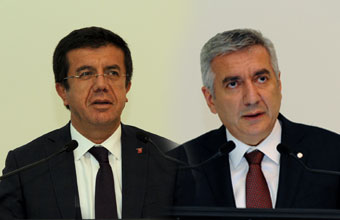
Istanbul Chamber of Industry (ICI) held its regular monthly meeting themed “Significance of Investments, Exports, and Regional Cooperation in the Beginning of a New Era that Relies on Production Economy as a Fundamental Strategy” on June 22, 2016. Nihat Zeybekci, Minister of Economy, attended the June Assembly meeting moderated by Zeynep Bodur Okyay, President of ICI Assembly.
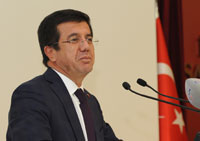
Nihat Zeybekci,
Minister of Economy
Minister Nihat Zeybekci said that Türkiye must be involved in every development that occurs in the region if it was to secure a peaceful existence in Anatolia. Zeybekci stressed the necessity of Türkiye to master a variety of fields including energy and raw materials, finances and financial markets, consumption habits, and distribution channels. During his speech, Minister Zeybekci suggested that Türkiye adopt a proactive approach towards regional and global developments and said: “If a new world order is imminent, Türkiye must be one of its founders.”
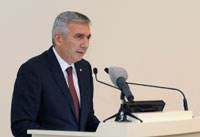
ICI Chairman Erdal Bahçıvan
Commenting on the Assembly’s main agenda, ICI Chairman Bahçıvan said: “Instead of regional, conventional incentives, a controllable new model needs to be created to take business needs into account: a tailor-made model. We are requesting support for transferring the idle machinery park at Istanbul to the Eastern and Southeastern Anatolia for investment purposes. Extension of Eximbank loans without letters of guarantee up to a certain percentage as a criterion of past-performance will serve as a lifeline to access banking resources that get scarcer every day.” Bahçıvan said that industrialists need a reformist incentive system and added: “In our endeavor to allow Türkiye attain its great goals, we, the industrialists, are willing to set foot on the turquoise carpet and stand together with our Government through this journey, with greater effort and commitment than ever.”
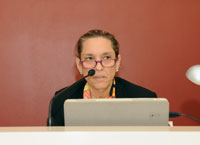
Zeynep Bodur Okyay,
ICI President of Assembly
Zeynep Bodur Okyay, ICI President of Assembly, opened the meeting with a touching speech commemorating her recently deceased father, Ibrahim Bodur. She quoted her father’s words, “Production economy is the most important item on Türkiye’s agenda,” and told how Ibrahim Bodur devoted his life to production in and development of Türkiye. ICI President of Assembly Okyay said: “My father Ibrahim Bodur spent hard efforts on investing in four corners of Anatolia. He spent his life fully committed to the industrial sector. I would like to thank the ICI for your support after my father Ibrahim Bodur’s passing. This has been the greatest commemoration one could expect from a Chamber.”
Zeynep Bodur Okyay then commented on the Assembly’s agenda:
“Geographically, our country is located in a challenging region, as we all know. This year’s Q1 growth rate was announced to be 4.8%. However, we saw that this growth was driven by consumption rather than production. Also, at the ICI, we announced Türkiye’s Top 500 Industrial Enterprises survey. Looking at the tables, we see increasing financial expenses. We must keep our focus on a middle- and advanced-technology economy so that Türkiye may reach its goals. This year witnessed the introduction of very important incentives. We are grateful for such support packages. We are aware of the ongoing efforts to overcome the problems at R&D centers. In the past, we experienced certain issues with the land costs at the OIZ. We are aware of the work put out to address such matters. It is important for us to see the Investment Report Package launched as soon as possible.”

Okyay then invited ICI Chairman Erdal Bahçıvan to take the floor for his speech on the Assembly’s main agenda. Bahçıvan told that the industrial sector appreciated the recent package of measures announced by the government to improve the investment environment. He stressed that the transformation into high-added-value and advanced-technology sectors that industry needed was only possible with a reformist system of incentives.
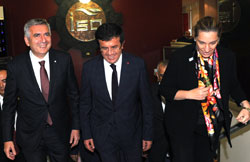
Bahçıvan further emphasized that, alongside the domestic investments, the incentives should also vitalize foreign direct investments, which have been on a downward trend since the global crisis. “Turkish industrialists’ and producers’ investment appetite will grow as long as the economy administration keeps their appetite for reforms and commitment for a stable economy. This supports Prime Minister Binali Yıldırım’s words, ‘We will roll out a turquoise carpet for the investors.’ In this context, in our endeavor to allow Türkiye attain its great goals, we, the industrialists, are willing to set foot on the turquoise carpet and stand together with our Government through this turquoise carpet journey, with greater effort and commitment than ever.”
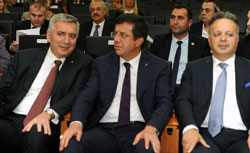
Regarding the reformist incentive system he pointed out, Bahçıvan told: “Instead of region-specific conventional incentives, we should adopt a new company- and project-based model that takes companies’ needs into account: a tailor-made model. The new incentive system must be designed similar to the implementation of the ‘Turquality’ system. We need a both project-based and controllable model, where evaluations will be based on a company’s vision, past performance, human resources, investment approach, financial status, and shareholding structure,” said Bahçıvan, who stressed that the ideal of wealth has moved away from the real economy, production and labor around the world. “Unfortunately, we are living in an era that prioritizes virtual wealth instead of production. So much so that global financial markets have reached a magnitude of USD 700 trillion against an economy of USD 70 trillion, which is thought-provoking.”
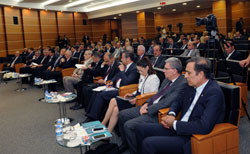
Bahçıvan summarized the issues experienced by the industrialists on matters related to the Ministry and expressed his solution proposals under eight categories: “We are requesting support for transferring the idle machinery park at Istanbul to the Eastern and Southeastern Anatolia for investment purposes. In doing so, we will both prevent a waste of resources by utilizing an idle asset and, at the same time, transfer know-how and experience to the region alongside the machinery. Domestic procurement must be a priority for not only public purchases but also for others that fall under the public domain, as in the case of build-operate-transfer procurements. It is an important idea to support investments in four provinces in the East and Southeast, as they are planned to become centers of attraction. Continuous export support for investments in the region will contribute to the growth of investments there.”
Bahçıvan commented on the incorporation of Turkish Eximbank into the Ministry of Economy, saying: “It is important that Turkish Eximbank further increases the medium- and long-term loans and continue to extend loans with affordable interest rates and proper guarantee conditions. Eximbank loans have been provided against letters of guarantee to those companies exporting smoothly and in a stable manner; however, from now on, a certain percentage of those loans should be considered a past performance criterion and extended without a letter of guarantee. The Credit Guarantee Fund’s resources might be utilized for this purpose. Such an opportunity will save substantial letter of guarantee commissions, and the limits released will serve as a lifeline to access banking resources that get scarcer every day.”
Afterwards Minister of Economy Nihat Zeybekci took the floor to convey significant messages for the industry and economy. Zeybekci noted that the visit to the ICI was the Ministry’s first after the formation of the new government, and stressed that this reflected the importance they attached to the ICI. In the beginning of his speech, Zeybekci also commemorated Dr. Hacı Ibrahim Bodur, former Chairman of the ICI Assembly who passed away last month. He mentioned Bodur’s contributions to Türkiye, citing him as a model.
Türkiye had to produce in order to achieve a sustainable development, said Zeybekci, who emphasized that it was impossible for any country to achieve success without production. He pointed out to the fact that territories are now determined based on economics instead of ideologies, as was the case prior to 1990. Having reminded the participants of Inönü’s words during that period, “A new world order will be shaped and Türkiye will secure its place within that order,” Zeybekci explained that Türkiye would not achieve progress with a passive approach. He suggested that Türkiye must be involved in every development that occurs in the region if it was to secure a peaceful existence in Anatolia. In this regard, Türkiye has to master four fields, according to Zeybekci, who listed these as “energy and raw materials, financing and financial markets, consumption habits, and consumption and distribution channels.”

Zeybekci said that their achievements in the past had exceeded expectations, reminding that Türkiye made it into the top 20 economies in the world and reached a per capita GDP of $10,000 as a country that manufactured using know-how and patents held by foreigners. Zeybekci pointed out that Türkiye needed a mobilization like the one organized during the early years of the Republic in order to reach its targets and quoted Prime Minister Binali Yıldırım’s words: “We should not pass our problems on to our grandchildren.”
The USA’s policy of cash abundance since the crisis in 2008 affected Türkiye as well, Zeybekci said. However, he explained that the European Central Bank’s policies have had a higher influence on Türkiye since 2013, as 45% of Turkish exports are sold to the EU countries, where Türkiye receives 70% of the foreign direct investments from.
Zeybekci said that Türkiye was the only country to sign a Customs Union agreement without being an EU member, and noted that a sovereign country should have avoided such an agreement. According to him, both Türkiye and the EU benefit from that agreement but it must definitely be revised prior to the Transatlantic Trade and Investment Partnership agreement negotiated between the U.S. and the EU. Zeybekci highlighted that the new agreement will be revised to encompass agricultural, service and public procurements as well.
The ICI’s visit to Iran and the goodwill agreement signed last month were very positive developments according to Zeybekci, who cited Iran as the top target country in terms of economic interests. Zeybekci also referred to the efforts to strike free trade deals with South Korea, Japan, Singapore, Malaysia, and Mexico.
Next, Assembly members took the floor to express the issues facing their individual sectors, which was followed by a discussion of the points brought up by Minister Zeybekci. As this year’s Assembly Meeting of June coincided with Ramadan, the meeting was concluded with the iftar dinner.